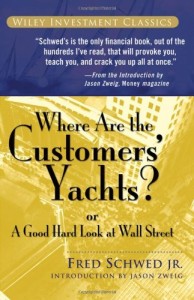Sometimes I procrastinate reading something really important to the point that I want to kick myself. Over the years I’ve seen Where Are The Customer’s Yachts? By Fred Schwed listed on numerous ‘Best Of’ lists of financial books, but only now got around to it in 2016? Ugh, no excuse for me.
But don’t think of this as a financial book.
This is one of the best pieces of comedic writing I’ve ever read. Seriously.
Schwed’s voice at points reminds me of A.A.Milne, in that he begins with a banal-sounding truism, and then veers off – in the second part of his sentence – into an unexpected absurdity, unveiling a deeper truth. It’s not unlike my favorite faux-philosopher Jack Handey’s style, except Schwed’s actually somewhat useful, rather than just plain bonkers.
I say useful because we all need clever ways to defend ourselves against myths of Wall Street and its fawning handlers within the Financial Infotainment Industrial Complex. Schwed satirically punctures our deeply-held myths in a totally goofy way.
He published this in 1940, following his experience on Wall Street in the 1920s and 1930s, but you know what? Yes, you do know what. Plus ca change plus c’est la meme chose.[1]
The title, if you didn’t know, refers to an apocryphal story of a newbie visiting lower Manhattan who is shown all the bankers’ and brokers’ impressive yachts. Long before #FeelTheBern and Occupy Wall Street, Schwed’s retelling of the joke tapped into our suspicions about the inflated compensation of the financial industry.
So, read this for the hilarity, but understand that the sly truths slipped in there might just help us as well.
On market predictions
Schwed nails the point that Wall Street’s and the Financial Infotainment Industrial Complex’s predictions aren’t worth more than a printed almanac describing the weather over the next 365 days.[2]
I received a link from a friend genuinely concerned about this headline in the beginning of 2016: “Sell Everything! 2016 Will Be a Cataclysmic year, warns RBS”. It’s hard to explain just how useless these types of predictions really are, unless you’ve been inside the beast and can see these prophesies for what they are. Schwed has some hilarious stuff on this topic.
On Short-Selling
Back in the midst of the 2008 crisis short-selling became unpatriotic and in some limited cases (like naked-shorts) illegal. Popular aversion to short-selling clearly has a long history, as Schwed describes the early 20th Century views and blows up the mythology there as well.
On Options Trading
Schwed describes, tongue firmly in cheek, the possible mechanisms and joys of options trading. Helpfully, he follows that up with a few explanations of how puts and calls and straddles work, although mostly he describes the funny patter of options traders attempting to attract customers. If you’ve ever dealt with options traders (I have!) its pretty funny, and true.
We read useful other thoughts, couched in humorous self-deprecation. The author directly addresses why Schwed – by 1940 a former stock-broker and dabbler in stocks himself – isn’t wealthier.
In his own words:
“…[M]y tendency has been to buy stocks, all a-tremble as I do so. Then when they show a profit I sell them, exultantly. (But never within six months, of course. I’m no anarchist.) It seems to me at these moments that I have achieved life’s loveliest guerdon[3] – making some money without doing any work. Then a long time later it turns out that I should have just bought them, and thereafter I should have just sat on them like a fat, stupid peasant. A peasant, however, who is rich beyond his limited dreams of avarice.”
See, that’s what I’ve been trying to say all along.
That, and also, read his book.

Please see related posts:
All Bankers Anonymous Book Reviews In One Place
Never Sell! From Disney to Churchill
Talking One’s Book – Mistrust ‘The Experts’
[1] Important note: I have no idea what that means. As my close personal friend Steve Martin says, the French have a different word for practically everything.
[2] Every year a favorite restaurant-owner in my neighborhood hands out an annual paper calendar printed with exactly that: The upcoming weather for the next year, throughout the various regions of the United States. Every time I tear off the page of a new month, I take the time to read that months’ weather. For some reason the subtle humor of the The Liberty Bar calendar never gets old for me.
[3] I learned a word today!
Post read (1543) times.






4 Replies to “Book Review: Where Are The Customers’ Yachts by Fred Schwed”
I honestly didn’t know this was a book, thought it was just a punch line to the apocryphal story. Thanks for the review, going to read it now.
It’s really good, if you don’t mind 1940s humor. It works for me. Tell me how you liked it.
Okay, finally received it from Amazon and finished it last night. In a time when most investment books are ultimately too serious and imbued with a sense of gravitas, Schwed’s self-deprecating take on himself and everyone else on Wall Street is refreshing.
More than anything, Schwed shows that human psychology doesn’t change. His take on investment trusts (now known as mutual funds) is spot on for then and even now. The ‘diversification’ they trumpet doesn’t matter when the whole market is collapsing, because the ‘trust’ or fund is diversified across the whole market, so when the market crashes, so do the trusts.
I am guessing it was much easier for people to obtain margin accounts at that time, because people trying to use margin to juice their earnings is one of his biggest criticisms.
His take on option salesman is amusing, mainly because I don’t think he could imagine the options markets today.
Overall, an excellent read, and well worth the money.
I thought so too! Glad you liked it. A good combination of super-funny, but also true and useful